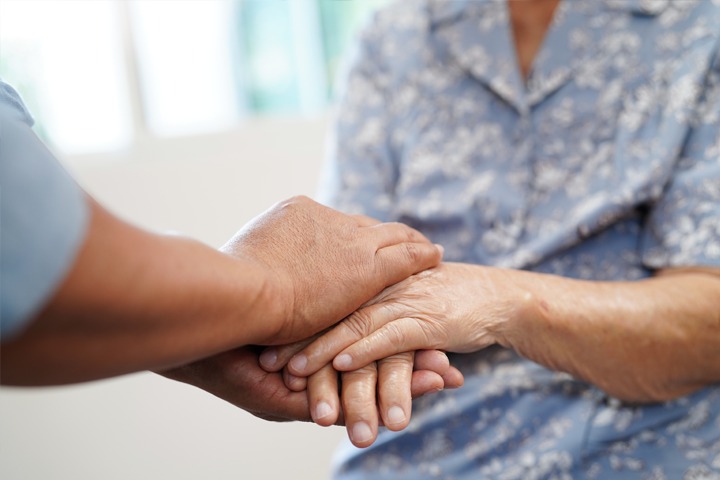Thinking and talking about end-of-life care can be hard. But offering the best possible care during difficult times may help bring you and your family comfort.
It may help to know that patients and families who have participated in hospice report wishing they had gotten care sooner, according to the Hospice Foundation of America. Read on to learn more about hospice care, so you can be more prepared if the time comes to choose this kind of care for you or a loved one.
What is Hospice Care?
Hospice is a type of medical care that helps increase the quality of life of someone living with a terminal illness. Hospice typically provides support and care during the final stages of a health condition that will likely cause death, like cancer, heart disease, emphysema and advanced dementia. Many are surprised to learn that some hospice patients who show improvement (like cancer remission) can stop hospice care and go back to treatment in another medical setting.
How is Hospice Care Different Than Other Types of Care?
With hospice care, a patient's emotional and even spiritual needs get attention, along with their physical needs. Physical needs might include helping to manage nausea, pain or shortness of breath. A hospice team, which typically includes nurses, social workers, physicians and possibly chaplains or other religious officiants, work together to provide care. Family caregivers often remain at the center of this team.
What is the Difference Between Hospice and Palliative Care?
It's easy to get confused about the difference between hospice care and palliative care. Hospice care is only available toward the end of someone's life, while palliative care — special care focused on providing relief from symptoms, pain and stress — is available to anyone with a serious illness. While palliative care might be provided as part of hospice care, the opposite isn't always the case. To be eligible for hospice care, a patient must:
- Stop curative or life-prolonging treatments
- Have a terminal or life-limiting condition (with six months or less to live)
How do I Choose the Best Hospice Option?
Choosing the right hospice care may feel overwhelming. This list of questions can help guide you through the process of finding the right hospice for your loved one. Consider the following:
- Does the hospice accept my care recipient's insurance?
- What services and treatments are covered and where are they provided?
- Who will be part of the hospice team?
- Does the hospice have help after business hours? Nights? Weekends? Holidays?
- If I call with an urgent need, how long will it take for someone from the hospice team to respond?
- How will the hospice team keep my family and I informed and part of the decision-making process?
- Can my care recipient still see their regular doctor on hospice?
- What are our options if we need a break from providing care?
If you have more questions about hospice or if it may be time to explore hospice as an option for your loved one, talk to their medical team or contact a local hospice. The more you know about the benefits of hospice, the more you can help your loved one take advantage of this compassionate, high-quality care when the time is right.
Resources for TRS-ActiveCare and TRS-Care Standard
Provider Finder®
If you or your dependent need palliative or hospice care, Provider Finder® offers an easy way to find a doctor or facility. You can search by location, gender or specialty. You can also research providers using patient reviews, certifications and recognition information.
Personal Health Guide
Have more questions? A Personal Health Guide can help you find an in-network provider 24/7. Call 1-866-355-5999 or chat through the BCBSTX App, available in the Apple App Store or Google Play Store.
Mental Health Care
Mental health care is health care. That's why every TRS-ActiveCare and TRS-Care Standard plan covers mental health. Caregivers can experience a range of mental health conditions. Don't wait another day. Get care for depression, stress, anxiety, alcohol or drug misuse and other conditions.
- In-Person – See an in-network therapist, psychiatrist or other mental health professional. Headway makes finding mental health providers and scheduling appointments easier.
- Virtually – Use Teladoc to speak with a licensed mental health provider online or over the phone for adults and children age 13 and older.
- Digitally – Learn to Live is a digital mental health program available at no added cost to you. Its programs can help you with stress, anxiety, depression, substance abuse and more.
- TRS-ActiveCare
- TRS-Care Standard

Resources for TRS-Care Medicare Advantage
Learn More About Hospice Care Benefits
Contact UnitedHealthcare to learn more about hospice benefits or for help finding a hospice facility toll-free at 1-866-347-9507, 7 a.m.–6 p.m. CT Monday–Friday.